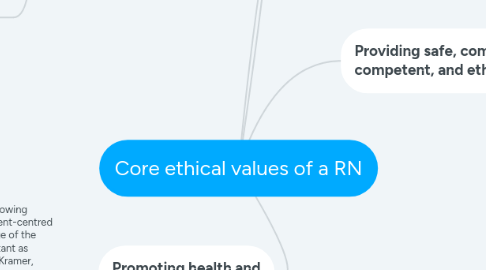
1. Promoting justice
1.1. RNs understand that health problems extend beyond the individual patient; health problems are interrelated and the SDOH must always be considered
1.1.1. Education of an RN includes explicit focuses on SDOH and social justice (CNA, 2015)
1.1.2. Systems of oppression influence individual health, and need to be addressed as vigorously as individual health needs
1.1.2.1. Advocacy is a core competency for RNs, even at an entry-level to practice (CNA, 2015)
2. Promoting and respecting informed decision-making
2.1. Promote a patient's informed decision-making, with the goal of support people in setting and achieving their own health goalss
2.1.1. View the patient as an active participant in their care, rather than as a recipient of care (CNA, 2017)
2.1.1.1. Respect for various ways of knowing enables RNs to take a more client-centred approach, where the knowledge of the patient is considered as important as empirical knowledge
2.1.1.2. Promoting informed decision-making is a core value of the RN (CNA, 2015)
2.1.1.2.1. Nursing ethical standards are consistent with the philosophy of harm reduction, which has been proven to benefit marginalized and high-risk patients (CNA, 2017)
2.1.1.3. Preserving dignity
2.1.2. RNs focus on health teaching, self-management, and health promotion (CNA, 2015)
2.2. Promote informed decision-making by the entire care team
2.2.1. Formal training in quantitative and qualitative research are an integral part of the BN programs across Canada.
2.2.1.1. Research contributes to practice excellence
3. Promoting health and well-being
3.1. Respect for various ways of knowing enables RNs to take a more client-centred approach, where the knowledge of the patient is considered as important as empirical knowledge (Chinn & Kramer, 2011)
3.1.1. Nursing ethical standards are consistent with the philosophy of harm reduction, which has been proven to benefit marginalized and high-risk patients (CNA, 2017)
3.2. BN programs across Canada emphasize care of the individual patient as well as care of an entire population.
3.2.1. Focuses on population health help RNs see the systemic nature of many health problems (e.g. the links between poverty and poor nutrition)
4. Providing safe, compassionate, competent, and ethical care
4.1. Experience coordinating care
4.1.1. Patients with high needs often require interdisciplinary care from many different team members
4.1.1.1. BN programs across Canada include a formal focus on leadership (CNA, 2015)
4.1.1.1.1. An entry-level competency for RNs is the ability to demonstrate leadership in the coordination of patient care (CNA, 2015)
4.1.2. Maintaining privacy and confidentiality
4.1.2.1. Leadership abilities enable RNs to share what needs to be shared for the patient's health care needs to be met, but also enables RNs to maintain strict privacy standards and a "need-to-know" mentality
4.2. Self-regulating profession with practice standards that must be demonstrated in order to achieve registration each year
4.2.1. Being accountable
